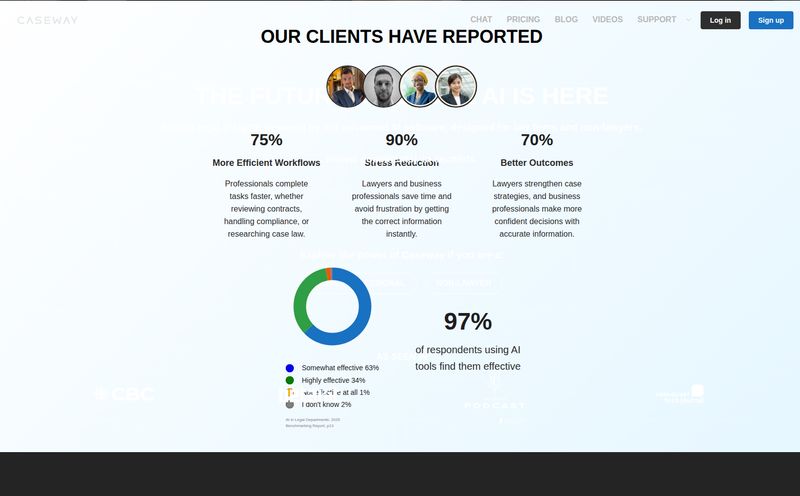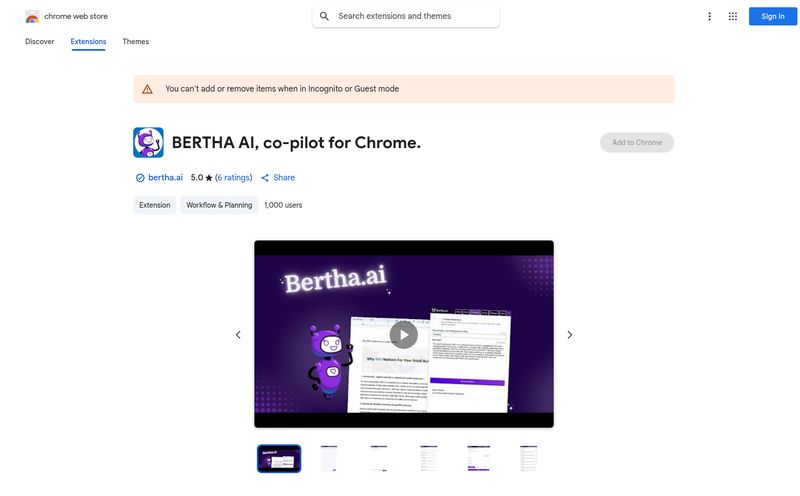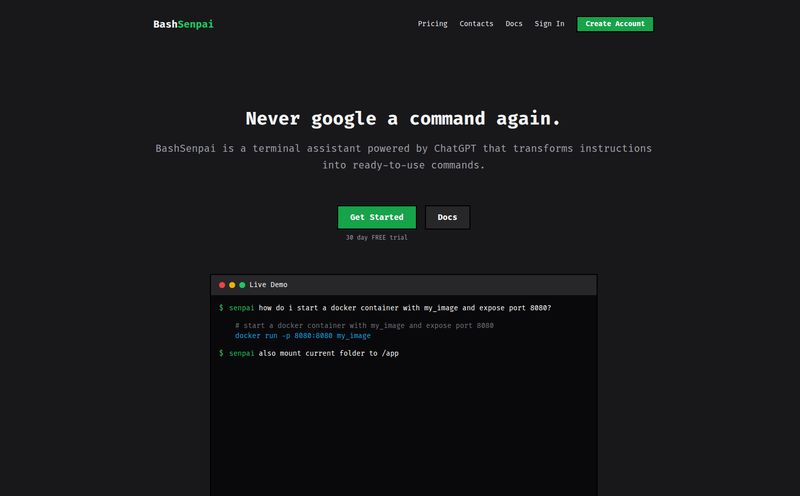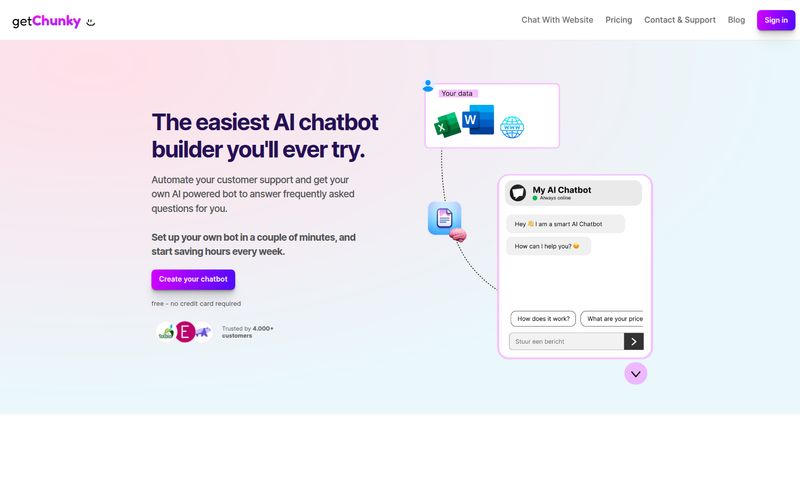If you're in the SEO game, or any knowledge-based field, your digital life is probably a mess. I know mine is. I've got a Google Drive full of half-finished strategy docs, a desktop littered with PDFs of case studies, endless bookmarks, and a notes app that looks like a conspiracy theorist's manifesto. We've all got that nagging feeling: “I know I read something brilliant about that… where did I put it?”
For years, we've chased the dream of a “second brain.” A perfect system to store and retrieve everything we’ve ever learned. And now, AI has stormed onto the scene, promising to be that brain. But most AI tools have a critical flaw—they’re smart, but they don't know you. They don't know your projects, your data, your secret sauce. They're a brilliant, but generic, brain.
That’s the itch that a new breed of tools is trying to scratch. I've been kicking the tires on one called bundleIQ, and I have to say, it’s got me thinking. This isn’t just another AI chatbot. It's something different.
So What on Earth is bundleIQ?
In the simplest terms, bundleIQ is an AI knowledge management platform. But that's a mouthful of jargon. Here’s my take: It’s a tool that lets you dump all your documents, notes, and web clippings into one place, and then have a conversation with your own data. You’re not just asking a generic AI; you're querying your own, personalized knowledge base through its chat interface, powered by an assistant named Alani AI.
Imagine having a research assistant who has read—and perfectly remembers—every single file you've ever saved. And you can just ask it questions. “Hey, what were the key takeaways from that SERP analysis I did last quarter?” or “Summarize all my notes on Google’s last core update and find common themes.” That’s the core promise here.
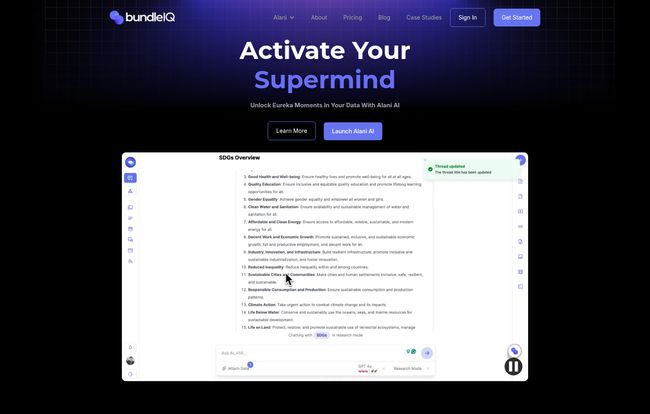
Visit bundleIQ
The Secret Sauce: Talking About RAG Without Being Boring
Okay, time for a little industry inside baseball. The biggest problem with large language models (LLMs) like the one behind ChatGPT is that they can… well, they can lie. Not maliciously, but they “hallucinate,” confidently making up facts when they don’t know the answer. They also have a knowledge cut-off date and, most importantly, zero access to your company’s private reports or your personal research.
This is where bundleIQ gets interesting. It uses something called a proprietary RAG system. RAG stands for Retrieval-Augmented Generation. It sounds complicated, but the idea is pure genius. Instead of just asking the AI to generate an answer from its vast, general knowledge, the system first retrieves relevant information from your documents. Then, it uses that specific, verified information to generate a precise answer. It's the difference between asking a random person on the street for directions and asking someone with a map of your exact location. It's a game-changer for getting trustworthy, context-aware answers from your own data.
My Favorite Things After a Few Weeks of Use
A tool can have all the fancy tech in the world, but if it's a pain to use, it's useless. I found bundleIQ refreshingly straightforward. Here's what stood out.
A Central Hub for All Your Brain Droppings
The first step is getting your information in. bundleIQ lets you aggregate data from all over the place. I started by uploading a bunch of old project proposals and reports. But the real magic, for me, was the Chrome extension. I could be reading an article on Search Engine Land, find a gem, and with a couple of clicks, suck it right into my knowledge base. No more copy-pasting into a random document that I'll lose a week from now. Everything goes into one pot. This alone started to reduce my background anxiety about losing good ideas.
Finding Needles in Haystacks with Semantic Search
We’ve all been conditioned by Ctrl+F. We search for exact keywords. Semantic search is a whole different beast. It understands intent. I could ask something like, “What are the risks associated with building too many backlinks too quickly?” and it would pull information from articles, reports, and notes that discussed this concept, even if they didn't use my exact phrasing. It’s searching for meaning, not just words. This is how you unearth insights you’d forgotten you even had.
Those "Eureka Moments" Are Real
The website talks about creating “Eureka Moments,” and I was skeptical. It sounds like marketing fluff. But then it happened. I was working on a content strategy for a new client in the finance space and asked Alani to pull together my best notes on E-E-A-T. It not only pulled the expected stuff from SEO blogs but also surfaced a paragraph from a two-year-old client report I had uploaded, where I discussed how building author credibility for a medical site led to a traffic spike. I had completely forgotten about that specific case, but the AI connected the dots between 'credibility' and 'E-E-A-T' and put them right in front of me. That's not just retrieving data; that's facilitating discovery.
Okay, Let's Talk Money: The bundleIQ Pricing
Alright, the all-important question: what does this cost? The pricing structure is tiered, which I appreciate. There’s a path for everyone from the curious tinkerer to the full-blown enterprise.
| Plan | Price | Key Features | My Take |
|---|---|---|---|
| Essential | $0 /mo | 250 Pages, 25 AI Prompts, 1 Seat | A genuinely useful free plan. It’s more than enough to upload a few key projects and see if the workflow clicks for you. A no-brainer to start here. |
| Individual | $40 /mo | 10,000 Pages, 200 AI Prompts, 1 Seat | This feels like the sweet spot for freelancers, solo entrepreneurs, and serious researchers. The page and prompt limits are very generous. |
| Business | $750 /mo | 100,000 Pages, 2500 AI Prompts, 10 Seats | This is for teams. That price might look steep, but if you break it down, it's $75 per user for a shared, intelligent knowledge base. For a company struggling with information silos, the ROI could be massive. |
The Good, The Bad, and The AI-Powered
No tool is perfect. In my experience, it’s all about whether the pros outweigh the cons for your specific needs.
The biggest pro is obvious: it turns a chaotic mess of documents into a smart, queryable database. It solves the LLM's "knowledge gap" beautifully with its RAG system. It’s genuinely useful.
On the flip side, there's a concern I hear a lot about tools like this: does it make us lazy? Does relying on an AI to find connections for us erode our own critical thinking skills? It's a valid question. But I see it differently. I think it automates the low-level grunt work of finding and collating information, which frees up more of my mental energy for the high-level work: strategy, creativity, and drawing the final conclusions. It’s an accelerator, not a replacement for my brain. And yes, the jump to the Business plan is significant, so smaller teams will need to carefully consider the value proposition.
"I've been really shocked at how good ALANI is at giving me feedback using my own data. I am testing a version where I uploaded a ton of medical records, depositions, expert reports and demands. I can ask it questions from various points of view (plaintiff, defendant, doctor, etc) and it is spot on with summarizing the data from various perspectives for doing so and with a tone that is precise, medical and insurance-ish... and it includes citations for where it pulled the data. I'm able to get into the weeds of a case and prepare for depositions so much faster. I've never seen anything like it. It's truly changing my workflow in a deeply disruptive way." – Dan Robinson, Attorney
Who is bundleIQ Really For?
So, who should drop what they're doing and sign up? Based on my time with it, and the testimonial from Dan Robinson, I see a few clear winners. Legal professionals, academic researchers, and market analysts who are swimming in dense documents would see immediate benefits. Content marketers and SEOs like me can use it to build a swipe file on steroids. Consultants and small agencies can create a shared brain for all their client work, ensuring institutional knowledge doesn't walk out teh door when someone leaves.
If you're someone whose value is tied to synthesizing information from many sources, this is a tool built for you.
In the end, bundleIQ feels like a significant step toward that “second brain” we’ve all been after. It’s not just about storage; it's about intelligence and interaction. By grounding its AI in your own, curated data, it becomes a powerful partner in your thinking process. With a free plan that's actually functional, there's very little reason not to take it for a spin. You might just have your own Eureka moment.
Frequently Asked Questions about bundleIQ
- What is a RAG system and why is it important?
- RAG stands for Retrieval-Augmented Generation. It's a type of AI system that first finds relevant information from a specific dataset (like your documents) and then uses that information to create an answer. It's important because it makes AI responses more accurate, trustworthy, and specific to your context, reducing the risk of the AI making things up.
- Can I import data from tools like Google Drive or Notion?
- The platform focuses on data aggregation from internal and external sources. While direct, one-click integrations with every tool might vary, its system for uploading documents and the Chrome extension cover a huge range of use cases for getting your knowledge into the system, whether its from your hard drive or the web.
- Is my data secure with bundleIQ?
- For any business, especially one handling proprietary data like bundleIQ, security is a top priority. Like any reputable SaaS platform, they employ enterprise-grade security measures to ensure your data remains private and protected. They wouldn't have clients like NYU Langone Health without it.
- How steep is the learning curve?
- Based on its clean interface and chat-based nature, the learning curve is surprisingly gentle. If you know how to upload a file and type a question into a chat box, you’ve mastered the core functionality. The power comes from the quality of the data you feed it.
- Is the free "Essential" plan actually useful?
- Absolutely. With a 250-page limit, you can upload a significant project's worth of documents to test the entire workflow from data import to AI querying. It's a perfect, no-risk way to see if the tool fits your needs before committing to a paid plan.
- Can bundleIQ replace a human research assistant?
- It can replace the most time-consuming parts of a research assistant's job: finding, sifting through, and summarizing large volumes of text. This frees up human researchers to focus on higher-value tasks like analysis, validation, and creative thinking. Think of it as a powerful collaborator, not a complete replacement.
